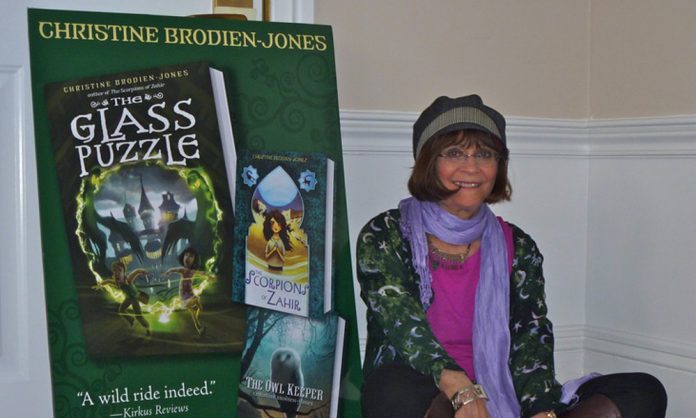Christine Brodien-Jones tells us about her latest novel, The Owl Keeper, and also offers some fantastic promotion tips. Read more about her new novel at www.owlkeeper.com.
What inspired you to write your latest book?
My inspiration while writing The Owl Keeper (Delacorte Press/Random House) can be traced to all the futuristic, post-apocalyptic novels I’d read over the years, ones like On the Beach, The Chrysalids, 1984, The Drowned World, The Handmaid’s Tale, The Children of Men. And I remember Stephen King reading out loud from The Stand in a class he taught at the University of Maine. Recently, it struck me that my protagonist Max’s journey north to the Frozen Zone mirrors the flight of Victor Frankenstein and his monster to the Arctic Circle. I loved the book Frankenstein—and the Boris Karloff film, too.
I started writing The Owl Keeper in late 2001, after the events of September 11th. Not surprisingly, the bleakness of that time found its way into the book, which is set in a grim and hopeless future. The idea for the story began with a mysterious image of a boy standing beneath a tree in a dark forest, looking up at an owl. I kept thinking about him and wondering what he was doing there.
Other influences came from unexpected places. The oppressive government in the book, the High Echelon, is based on my experience living in Spain under the dictator Francisco Franco—while there, I always had a sense of being watched. Max’s aversion to sunlight was the result of reading an article about certain children who are unable to tolerate ultraviolet light. Also I saw a strange Gothic film called The Others, about two siblings who are fatally allergic to sunlight, which stayed with me long afterwards.
How do you keep from getting distracted when you’re writing?
Good question! Most days I’m up early—the best time of the day for writing. I check my emails first thing and try to restrict Internet browsing for the rest of the morning. Fortunately, I live near the ocean’s edge, where the loudest sounds are seabirds, so most days it’s quiet here.
When my writing is going well, or if I’m working on revisions, I’m able to focus for long periods of time. When I get stuck, I try to keep writing, maybe on a different piece of work, or on elements of my book that need more developing.
I also do yoga on a regular basis. Exercise is important (both physically and mentally) to counterbalance all those hours at the computer. Discomfort can be distracting, which I found out the hard way: sitting in a wooden chair to type did a number on my back. Now I have an ergonomic chair.
The bottom line with distractions is this: I sit at my desk and type. I keep putting words on the page, even if they’re rubbish. Discipline is the key and writing is hard work. It’s not always exciting or fun, and although other people can help you a lot, you’re essentially on your own.
How is eBook technology changing things for you as an author?
Speaking as a children’s author, I’d say eBook technology hasn’t really changed things much for me so far. I write books for young readers, and whether they read the hardcover book, the paperback, or the eBook makes no difference: the main thing is that they’re reading!
I think eBooks definitely have a place, especially among tweens and teens growing up in this new digital world with Kindles and Nooks. But I don’t think books will become obsolete any time soon. I believe children’s books especially will always be popular in book versions.
It’s interesting to see what some authors are doing with eBooks: Cory Doctorow, for instance, gives away eBook versions of his books, encouraging his eBook readers to buy a print copy and give it to a school, a library or friend. And J.K. Rowling is now making the Harry Potter series available as an eBook on her interactive website Pottermore, saying she wants to “bring the stories to a new digital generation.”
What else can an author do besides promoting their books on Twitter and Facebook?
In 1992, when my first book The Dreamkeepers (Simon & Schuster) came out, publishing was a totally different world: promoting books was done mainly by publicists. By contrast, today there are countless opportunities to promote your book online, so be selective and choose what works for you. And work with your publicist! Publishing companies have limited PR budgets, and publicists welcome talent, enthusiasm and book promotion suggestions.
An absolute must is creating a website to feature your book, book trailer and information about yourself. I set my site up through the Authors Guild using their Site Builder. Be sure, too, to seek out a niche for your book: what makes it unique? With The Owl Keeper I contacted local wildlife centers and combined a reading with a winter “owl walk.” I also adopted a rescue owl.
Blogs are a great way to get noticed. I use WordPress; another popular one is Blogger. Blogs, however, require time and commitment—lots of it. Alternatively, contribute to a group blog. There are lots out there, ones like Smack Dab in the Middle (http://smack-dab-in-the-middle.blogspot.com/), for middle grade authors, and fantasy writers’ The Enchanted Inkpot (http://enchantedinkpot.livejournal.com/).
Book trailers are a great way to showcase your book. They’re fun and you don’t have to pay a fortune to get one made. Look around for untapped talent. I hired a music student from Boston to make a trailer for The Owl Keeper and, as a bonus, he composed the music for it! Another option is making your video: take an Apple workshop, for instance, and learn how to use iMovie.
Connect with bloggers/reviewers who are enthusiastic about promoting authors. Be a guest blogger on Cynthia Leitich Smith’s fabulous site Cynsations (http://cynthialeitichsmith.blogspot.com/), or connect with a promotion site like Authors Now! (http://www.authorsnow.com/) where they’ll feature your book on their site. Blog tours are getting big: The {Teen} Book Scene (http://theteenbookscene.weebly.com/) will help you set one up. Join Goodreads and give away copies of your book. Set up an author page at Amazon Author Central.
If you write for children, join the Society of Children’s Book Writers and Illustrators (http://www.scbwi.org/). SCBWI is a fantastic resource, including information about promoting your book. I’ve attended many excellent workshops on book marketing/publicity at SCBWI conferences. Connect with other authors through SCBWI, JacketFlap, and/or Scribblerati.
You can learn about book promotion from bloggers—check out author Nathan Bransford’s blog (http://blog.nathanbransford.com/), Shelli Johannes-Wells’ Market my Words (http://faeriality.blogspot.com/), Jeff Rivera’s The Gatekeepers Post (http://www.gatekeeperspost.com/). Of all the books out there, my favorite is Jeff Vandermeer’s “Booklife: Strategies and Survival tips for the 21st-Century Writer.”
Traditional, offline ways to promote your book: teaching creative writing workshops, appearing at local schools and libraries, speaking at conferences, showing up at book festivals. These are all ways to connect. And don’t forget to give out business cards, bookmarks and postcards (I design mine at iprint.com) – kids love ‘em!

Keisha Parker provides insightful news coverage, practical tips, and informative articles to keep readers updated and engaged.






